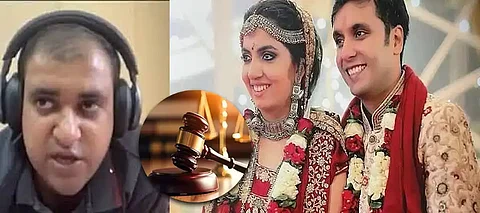

In ongoing legal battles, emotional trauma, and financial disputes, Puneet Khurana, a 40-year-old baker's owner from Delhi, tragically took his own life, allegedly due to relentless harassment by his estranged wife, Manika Pahwa, and her family. This deeply saddening incident is eerily similar to the case of Atul Subash, a techie from Bengaluru, who also succumbed to suicide under distressing circumstances just a month prior. The similarities in both cases raise critical questions about the legal system, the exploitation of judicial laws, and the often ignored mental health consequences for men facing such overwhelming situations.
Puneet Khurana, the owner of Woodbox Cafe in Delhi, took the painful step of recording a video shortly before his death. In his heart-wrenching message, he spoke of mental and emotional torture inflicted by his wife and in-laws. He alleged that his divorce proceedings initially agreed upon mutually, had taken a bitter turn, with unreasonable financial demands placed on him. Among these demands was an additional ₹10 lakh, which he could not afford. His video, released posthumously, revealed that Khurana felt trapped, helpless, and abandoned.
In the video, Khurana expressed his sorrow: I am about to commit suicide because I’m extremely tortured by my in-laws and my wife….. I cannot ask my parents as they already have paid enough.” His family has since alleged that the abuse was not limited to financial pressure but extended to emotional manipulation, including hacking into his social media accounts to further torment him.
Before his death, Khurana had a heated phone conversation with Manika Pahwa. According to police records, the exchange was hostile, with Pahwa using derogatory language and threatening to escalate matters, saying: “Beggar, tell me what have you asked for. I do not want to see your face. If you come in front of me, I will slap you,” Khurana’s response was resigned: “All of this doesn't matter anymore. Just tell me what you want.” The next day, Khurana was found dead in his home with marks around his neck. His family firmly believes that the emotional and financial harassment led him to take this tragic step. Police are now examining evidence, including phone recordings and CCTV footage, to understand the circumstances surrounding his death.
This heartbreaking case is reminiscent of the suicide of Atul Subash, a 34-year-old tech professional from Bengaluru. Subash, too, was caught in a web of emotional and legal battles. He was facing acquisitions. A 24-24-page suicide note, a 90-minute video, and a detailed checklist were found, revealing the mental and emotional toll he was enduring due to the ongoing legal disputes. Much like Khurana, Subhash felt trapped, suffocated by the pressure of legal acquisition, emotional distress, and the looming threat of being wrongfully punished. Both Khurana and Subhash Deaths highlight the immense psychological pressure men face in situations of marital discord, especially when manipulated by false accusations or financial demands. The constant fear of social stigma, wrongful legal implications, and the emotional turmoil stemming from these challenges seem to have pushed both men to a breaking point.
Both of these tragic suicides underscore a distributing trend in which the judicial systems while aiming to protect women, may inadvertently cause harm to men who are caught in manipulative relationships. Laws meant to protect women, such as those dealing with domestic violence, dowry harassment, and divorce proceedings, are often seen as biased towards female plaintiffs. While the intention behind these laws is commendable, to safeguard women from exploitation, the system is increasingly vulnerable to abuse.
In both Khurana’s and Subhash’s cases, the men were allegedly subjected to emotional, financial, and social manipulation, while the judicial process appeared to be heavily tilted in favor of the women. This imbalance has led to the acquisition that the system does not adequately protect men, who are also victims of domestic abuse, harassment, and false accusations.
The issue lies in the fact that many men face legal battles that are inherently skewed against them. The use of laws such as Section 498 (dowry harassment) and Section 406 (criminal breach of trust) has often been criticized for being misused, especially when the claims are fabricated. This leads to men being harassed, falsely accused, and financially ruined, all when the law may seem to disproportionately favor the female section, irrespective of the truth. Both Khurana and Subhash found themselves under the shadow of such accusations, unable to fight back or seek justice, ultimately leading to their tragic deaths.
As societal norms evolve, with both men and women now equally capable of earning and contributing to the family, the question arises: do your laws need to adapt? Should the legal system evolve to ensure that men too are protected from manipulation, harassment, and abuse, particularly in marital disputes?
There is a growing call for reforms that ensure both men and women are equally protected from any abuse, emotional manipulation, or financial distress. While protecting women from domestic violence and harassment remains critical, it is equally essential to safeguard the mental health and well-being of men, who often suffer in silence under the weight of false allegations and legal battles.
Altogether the tragic suicides of Puneet Khurana and Atul Shubhash bring to light the urgent need for legal reforms that balance protections for both men and women. The current system must evolve to ensure that justice is not only blind but also fair, addressing the needs and rights of both genders equally. It is time for the judicial systems to acknowledge the changing realities of relationships, where both men and women face significant pressure and challenges, and to create a legal framework that is just, impartial, and truly protective for everyone involved.